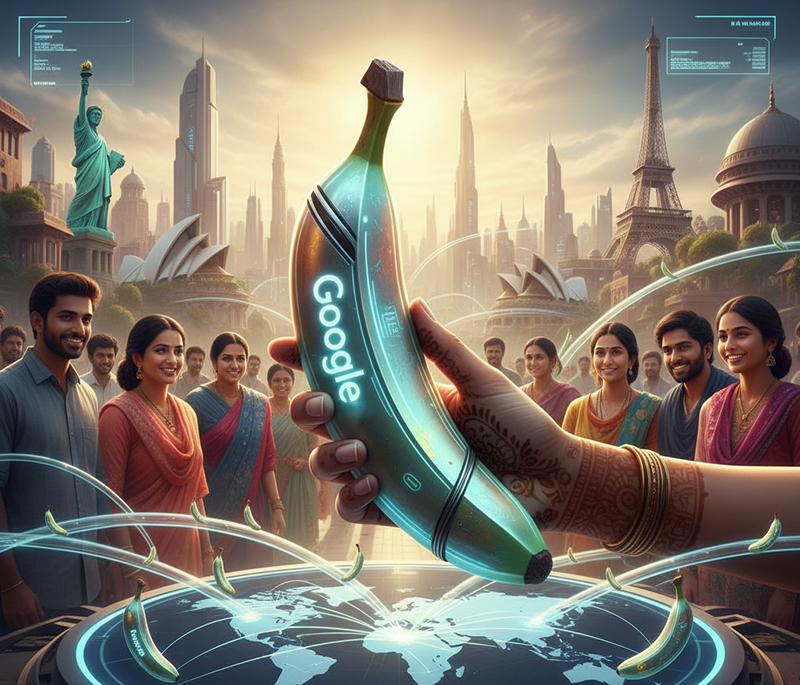Google’s latest image generation model, Nano Banana (officially named Gemini 2.5 Flash Image), has attracted significant global attention since its launch last month. India, leveraging its unique local creativity, has pushed the use of Nano Banana to new heights, driving trends in retro and regional styles. Simultaneously, growing attention is being paid to user privacy and security concerns. David Sharon, head of multimodal generation for the Gemini app at Google DeepMind, revealed that India is now the largest user country for Nano Banana globally. This AI generation tool has helped the Gemini app top the free charts on both the App Store and Google Play in India, while also performing impressively in global app stores.
As the world’s second-largest smartphone market and the largest online population after China, India demonstrates remarkable speed in adopting new technologies. Google is highly attentive to the unique and creative ways Indian users engage with Nano Banana: millions of Indians interact with it in highly localized and imaginative ways, spawning many unexpected new trends.
Following the latest news, one notable trend is users employing Nano Banana to recreate nostalgic Bollywood looks from the 1990s, virtually reproducing the era’s clothing, hairstyles, and makeup – a retro trend unique to India. Concurrently, users have developed a trend called “AI Saree,” generating retro-style portraits of themselves wearing traditional Indian attire. Another popular usage in India is generating AI selfies with “urban landmark” backgrounds, such as Big Ben or British telephone booths. Google observed that this type of content was particularly popular in the early stages after the product’s launch.
Indian users are also actively using Nano Banana to transform themselves into vintage stamp images, black-and-white portraits, and even attempting creative setups like “encountering their younger selves.” Interestingly, while some popular trends originated in places like Thailand or Indonesia, they gained global momentum propelled by their popularity in India. For example, the “doll style” trend (turning oneself into a mini figurine placed in scenes like in front of a computer) went viral globally after becoming popular in India. Beyond Nano Banana’s image generation, Indian users are also extensively trying the Veo 3 video generation model within the Gemini app, creating short videos from old photos of their grandparents or even great-grandparents.

Benefiting from these trends, the Gemini app saw average monthly downloads of 1.9 million in India between January and August 2025, approximately 55% higher than in the US and accounting for 16.6% of global monthly downloads. During the same period, cumulative downloads in India reached 15.2 million, far exceeding the 9.8 million in the US. Following the release of a new version of Nano Banana on September 1st, daily downloads of the Gemini app in India increased significantly. Single-day downloads soared to 414,000 on September 13th, a 667% surge from the beginning of the month. The app has held the top position in various categories on both iOS and Google Play charts since September 10th.
Although leading in downloads, India does not top the charts for consumer spending within the Gemini app. Since its release, global consumer spending on iOS platforms totals approximately $6.4 million. The US market accounts for the largest share at 35% ($2.3 million, approx. HKD 17.94 million), while India accounts for only 1.5% ($95,000, approx. HKD 741,000). However, between September 1st and 16th, consumer spending in India grew by 18%, an increase higher than the global average and the US market.
Similar to other AI applications, concerns regarding data privacy and security have been raised when users upload personal photos to generate images. Addressing external queries, Sharon responded, “When users make a request, we do our best to fulfill it without arbitrarily speculating on their intentions.” He also emphasized that Google is continuously strengthening its efforts and investments to combat data misuse and improve privacy protection.
Google has added a distinct diamond-shaped watermark to images generated by Nano Banana and incorporates hidden markers for AI content through SynthID steganography technology. An AI content provenance query platform will be opened to general users in the future; it is currently being piloted with industry experts and testers. Sharon stated that AI-generated content is still in its early exploratory stages, and Google will continue to gather feedback from users, media, academia, and other stakeholders to drive continuous product improvement and innovation.












